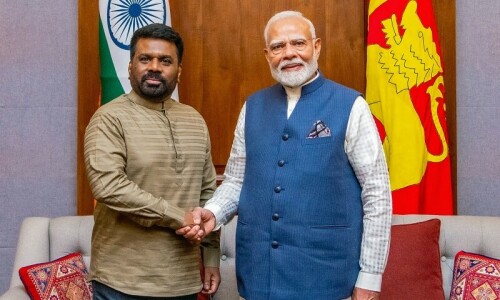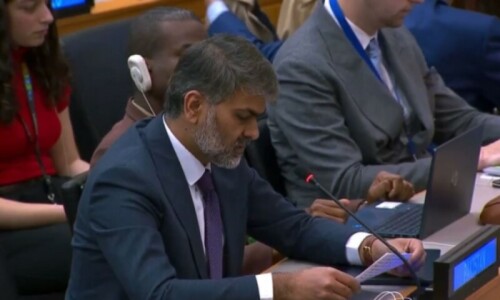On Sept 10, 1985, Law and Parliamentary Affairs Minister Iqbal Ahmad Khan tabled a draft bill which elicited an unprecedented uproar in the parliament. This was the draft of the bill called the Eighth Amendment.
On the face of it, this amendment was aimed at bringing about a ‘balance of power’ by empowering the President to dissolve the National Assembly, dismiss the prime minister and provincial governments, and order them to seek a fresh mandate.
But it did much more: the amendment changed the system of governance from parliamentary democracy to presidential and made the prime minister subservient to the president.
It aimed at minimising the status of the parliament, office of the prime minister, cabinet and other institutions. Without the president’s permission, the prime minister could not do anything. And in case of any disagreement, the president could dismiss the prime minister and his government and dissolve the assemblies.
All actions of the martial law government since July 5, 1977 takeover indemnified through an act of Parliament
These changes weren’t ceremonial either. Three years later, on May 29, 1988, General Ziaul Haq proved that he had intended to deploy the amendment when he developed a disagreement with the prime minister. Junejo’s government was summarily dismissed and the assemblies dissolved.
Other anomalies in the draft bill included the act of approving all actions of the martial law government taken from July 5, 1977, including the July 5 proclamation under which the civilian government was overthrown and martial law was promulgated. Similarly, all ordinances and martial law orders issued by the general over the past eight years as well as decisions of the military courts were to be legalised.
When the bill was tabled, it created uproar within the National Assembly. Members of the Assembly were not prepared even to talk about it, and termed the proposed amendment as tantamount to signing their death warrants.
This opposition shocked the presidential camp. Having assessed the mood of the MNAs, they began making efforts to hold meetings with a number of them to chalk out some way forward. Were the bill to not go through, there was a possibility that the general might have dissolved the National Assembly and sent everything packing.
With a conflict brewing, some senior politicians warned the sitting MNAs about what they could face at the hands of the general. Now the whole fiasco centred around a possible ‘give-and-take’ proposition. More meetings were held but they too ended without conclusion. Prime Minister Junejo then formed a committee with both liberal and right-wing elements, but they too could not settle on an acceptable solution.
When the bill was tabled, it created uproar within the National Assembly. Members of the Assembly were not prepared even to talk about it, and termed the proposed amendment as tantamount to signing their death warrants.
The situation on Independence Day also reinforced misgivings.
Gen Zia wanted to celebrate the day with extra fanfare. He announced that the Independence Day parade would be held at the capital, and he’d be taking the salute. PM Junejo also wanted to be there but he immediately got a message that according to the amended Constitution, only the head of the state (Gen Zia) was entitled to take the salute while the chief executive was not entitled. To pacify himself, Junejo asked his party to hold a public meeting in Lahore, where he would address the audience as the chief guest.
With a stalemate having developed, Gen Zia discussed the situation with his ministers who had told him about the MNAs’ mood, and advised them to withdraw the draft bill and replace it with a new one. After a week, the first draft bill was withdrawn and another draft bill was tabled before the House.
Although no significant changes were made in the second draft, it had a softer tone. It took many days to debate the second draft, however, it was passed on Oct 17, 1985, after some reports of ‘special messages’ to the groups of active members.
The Amendment changed, amended and revoked 19 clauses of the supreme law of the land. Through the amendment the status of prime minister was relegated to the lowest ebb. In simple words he had become a subordinate to the president.
The president was given the power to nominate the prime minister, provincial governors, judges of the high courts and Supreme Court, as well as the chiefs of armed forces. The prime minister now needed to inform the president about administrative affairs decisions and any suggestions for legislation. The president was authorised to ask the prime minister to seek a vote of confidence, promulgate ordinances and take other administrative measures. He could also ask the prime minister to hold a referendum on some thorny issues. The number of members in the National Assembly was also increased from 200 to 207.
The most important act of the Eighth Amendment was that the parliament indemnified all orders, ordinances and martial law regulations issued by the President, ratified the referendum, and the orders issued from July 5, 1977 (including the proclamation of martial law) to Sept 13, 1985. This was the main result Gen Zia wanted to attain.
The spectre of this Amendment loomed long after Zia’s death, as four successive democratic governments were dissolved under Article 58-2B. In April 1997, the Mian Nawaz Sharif government got the 13th Amendment passed unanimously by the parliament and scrapped the Article 58-2B, thereby restoring the supremacy and status of prime minister and the parliament.
Published in Dawn, Sunday Magazine, September 25th, 2015
On a mobile phone? Get the Dawn Mobile App: Apple Store | Google Play














































